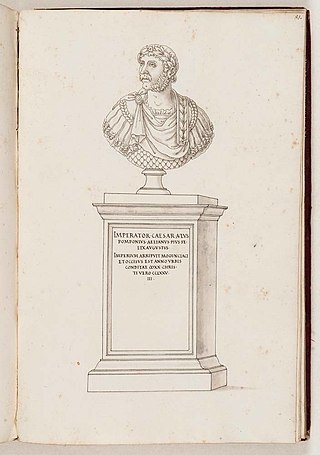Related Research Articles

Nicomedes IV Philopator was the king of Bithynia from c. 94 BC to 74 BC. He was the first son and successor of Nicomedes III of Bithynia.

Abellio was a god worshiped in the Garonne Valley in Gallia Aquitania, known primarily by a number of inscriptions which were discovered in Comminges, in the Pyrenees. He may have been a god of apple trees or the sun.

The magister equitum, in English Master of the Horse or Master of the Cavalry, was a Roman magistrate appointed as lieutenant to a dictator. His nominal function was to serve as commander of the Roman cavalry in time of war, but just as a dictator could be nominated to respond to other crises, so the magister equitum could operate independently of the cavalry; like the dictator, the appointment of a magister equitum served both military and political purposes.
Gaius Julius Caesar Strabo "Vopiscus" was the younger son of Lucius Julius Caesar and his wife Popillia, and younger brother of Lucius Julius Caesar, consul in 90 BC. His cognomen 'Strabo' indicates he was possibly cross-eyed, and the nickname 'Vopiscus' suggests he was a surviving member of a set of twins.

The Dictionary of Greek and Roman Biography and Mythology is an encyclopedia and biographical dictionary of classical antiquity. Edited by William Smith, the dictionary spans three volumes and 3,700 pages. It is a classic work of 19th-century lexicography. The work is a companion to Smith's Dictionary of Greek and Roman Antiquities and Dictionary of Greek and Roman Geography.

Pasiteles was a Neo-Attic school sculptor from Ancient Rome at the time of Julius Caesar. Pasiteles is said by Pliny to have been a native of Magna Graecia, and to have been granted Roman citizenship. He worked during a period where there was a demand for copies of, or variations on, noted works of Greek sculpture; the demand was met by the workshops of Pasiteles and his pupils Stephanus and Menelaus and others, several of whose statues are extant. According to Pliny, Pasiteles made an ivory statue of Jupiter for the temple of Metellus and made statues for the temple of Juno in the portico of Octavia.
Memnon of Heraclea was a Greek historical writer, probably a native of Heraclea Pontica. He described the history of that city in a large work, known only through the Excerpta of Photius, and describing especially the various tyrants who had at times ruled Heraclea.
Lucius Domitius Ahenobarbus, consul in 54 BC, was an enemy of Julius Caesar and a strong supporter of the aristocratic party in the late Roman Republic.

Cornelia was the first or second wife of Julius Caesar, and the mother of his only legitimate child, Julia. A daughter of Lucius Cornelius Cinna, Cornelia was related by birth or marriage to many of the most influential figures of the late Republic.
Gnaeus Acerronius Proculus was a consul of the Roman Empire in 37 AD, with Gaius Petronius Pontius Nigrinus as his colleague; that was the year Tiberius died.
Achillas was one of the guardians of the Egyptian king Ptolemy XIII Theos Philopator, and commander of the king's troops, when Pompey fled to Egypt in 48 BC. He was called by Julius Caesar a man of extraordinary daring, and it was he and Lucius Septimius who killed Pompey at the suggestion of the eunuch Pothinus and Theodotus of Chios.
Marcus Actorius Naso seems to have written a life of Julius Caesar, or a history of his times, which is quoted by Suetonius.
Aegus and Roscillus were two chiefs of the Allobroges, who had served Julius Caesar with great fidelity in the Gallic Wars, and were treated by him with great distinction. They accompanied him in his campaigns against Pompey, but having been reproved by Caesar on account of depriving the cavalry of its pay and appropriating the booty to themselves, they deserted to Pompey in Greece. Aegus was afterwards killed in an engagement between the cavalry of Caesar and Pompey.

Aelianus or Aelian was together with Amandus the leader of an insurrection of Gallic peasants, called Bagaudae, in the reign of Diocletian. It was put down by the Caesar Maximianus Herculius in 285. The rebellion he led with Amandus in 285 was attributed by some to Christianity, but Edward Gibbon doubts this in The Decline and Fall of the Roman Empire.
The gens Aponia was a Roman family during the later Republic, and the 1st century of the Empire. The gens is known from only a few individuals.
The gens Aquinia was a plebeian family in Rome. The gens does not appear to have been particularly large or important, and is known primarily from two individuals.
The gens Arpineia was an obscure plebeian family at ancient Rome. It is known chiefly from a single individual, Gaius Arpineius, an eques in the army of Caesar's army during the Gallic Wars.
The gens Aurunculeia was a plebeian family at Rome. None of the members of this gens ever obtained the consulship; the first who obtained the praetorship was Gaius Aurunculeius, in 209 BC.
The gens Cispia was a plebeian family at Rome. Although the gens was supposedly of great antiquity, the Cispii only achieved prominence toward the end of the Republic.
The gens Epidia was an obscure plebeian family at ancient Rome. The only members to achieve any importance lived during the first century BC.
References
- ↑ Appianus, Bellum Civile, iii. 23.
- ↑ Dictionary of Greek and Roman Biography and Mythology , William Smith, Editor.
![]() This article incorporates text from a publication now in the public domain : Smith, William, ed. (1870). Dictionary of Greek and Roman Biography and Mythology .
This article incorporates text from a publication now in the public domain : Smith, William, ed. (1870). Dictionary of Greek and Roman Biography and Mythology .{{cite encyclopedia}}: Missing or empty |title= (help)